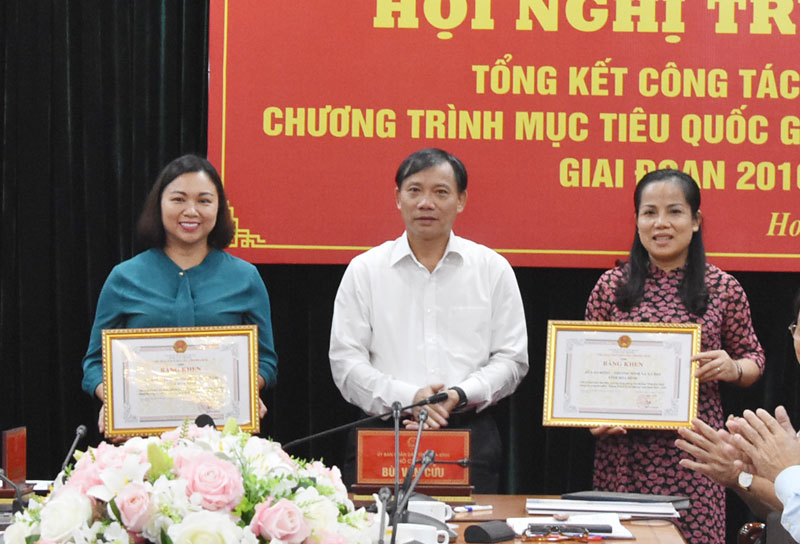
(HBO) – The People’s Committee of Hoa Binh province has reviewed the implementation of the national target programme on sustainable poverty reduction for the 2016-2020 period at a recent conference.
 Bui Van Khanh, Vice
Secretary of the provincial Party Committee and Chairman of the provincial
People’s Committee, presents certificates of merit to collectives that made
outstanding achievements in an emulation movement aiming to support the poor
over the past five years.
Bui Van Khanh, Vice
Secretary of the provincial Party Committee and Chairman of the provincial
People’s Committee, presents certificates of merit to collectives that made
outstanding achievements in an emulation movement aiming to support the poor
over the past five years.
During
the reviewed period, Hoa Binh has promptly and effectively rolled out policies
on social welfare, poverty reduction, vocational training and job generation.
The
emulation movement that calls for joint efforts in supporting the poor so that
no one is left behind has reaped significant achievements, helping to reduce
the province’s poverty rate from 24.38 percent to only 11.36 percent in the
five years. The rate is predicted to stay at 8.56 percent at the end of this
year.
At
the end of 2019, one district, six communes and 73 villages escaped from especially
difficult circumstances. However,
resources have remained limited given the huge demand for construction of
communes, especially disadvantaged localities.
Other
difficulties hindering the province’s efforts in poverty reduction include
limited investment in agriculture, and the inefficient coordination between
departments, agencies and localities in implementing programmes, projects and
policies towards ethnic minority-inhabited and mountainous areas.
In
2017, the province was hard hit by floods, leading to an increasing number of
poor households, including cases of relapse.
During
the 2021-2025 period, 10 trillion VND is expected to be injected into the
programme, withtrillion VND coming from the central budget and 2 trillion
VND from the local budget.
In
his remarks, Bui Van Khanh, Vice Secretary of the provincial Party Committee
and Chairman of the provincial People’s Committee, highlighted the
responsibility of leaders of agencies in fixing limitations over the past five
years, and stressed the need to step up the communication work in order to
raise public awareness of poverty reduction, improve the capacity of officials
involved in the work, and speed up the disbursement of projects./.
The Standing Board of the Hoa Binh provincial Party Committee has agreed in principle on a proposal by the Standing Board of the Party Committee of Hoa Binh city to gather feedback on the city’s 1:2000 zoning plan, which forms part of its broader urban development strategy.
Hoa Binh province has made notable progress in public administration reform and digital government development, with the satisfaction index among citizens and businesses reaching over 84%, according to recent government evaluations.
Thanks to great efforts by local authorities in recent times, the governance and public administration performance of Mai Chau district has been significantly improved.
In the afternoon of June 6, the Party Committee, the People's Council, the People's Committee and the Fatherland Front of Lac Son district solemnly held a meeting to celebrate the 139th anniversary of the district's founding (1886–2025) and the 79th anniversary of the establishment of the district's Party Committee (1946–2025). There was the attendance of Mr. Bui Van Thang, the Vice Chairman of the Provincial People's Council; Mr. Quach Tat Liem, the Vice Chairman of the Provincial People's Committee; Ms. Dang Bich Ngoc, the Deputy Head of the National Assembly Delegation of the province; as well as the former leaders of the province and district through various periods, who are the natives of the district.
Implementing the Politburo’s Resolution No. 57-NQ/TW on breakthroughs in science – technology, innovation, and digital transformation is a golden opportunity for the northern mountainous province of Hoa Binh to renew growth model, improve competitive edge and shorten digital gap.
Resolution 57-NQ/TW, issued by the Politburo on December 22, 2024, identifies sci-tech, innovation, and digital transformation as strategic breakthroughs to build a developed and prosperous nation. In Hoa Binh province, this spirit is not just a slogan, it’s being put into action through concrete initiatives that form a "new development triangle”: digital citizenship, digital economy, and digital administration.



 Bui Van Khanh, Vice
Secretary of the provincial Party Committee and Chairman of the provincial
People’s Committee, presents certificates of merit to collectives that made
outstanding achievements in an emulation movement aiming to support the poor
over the past five years.
Bui Van Khanh, Vice
Secretary of the provincial Party Committee and Chairman of the provincial
People’s Committee, presents certificates of merit to collectives that made
outstanding achievements in an emulation movement aiming to support the poor
over the past five years.